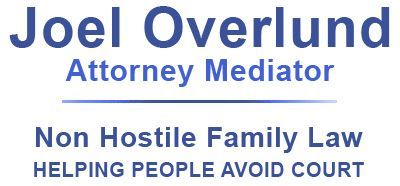Family Law Mediation Services with Joel Overlund
At Non Hostile Family Law, we specialize in family law mediation, a cornerstone of our practice led by Joel Overlund. With over 30 years of family law litigation experience, Joel believes firmly that mediation is a superior method of conflict resolution compared to traditional court proceedings. Our mediation services are designed to achieve durable resolutions efficiently, cost-effectively, and in a way that is more amicable for all involved parties.

Types of Mediation
Our practice offers two main types of family law mediation: facilitative and evaluative.
Facilitative Mediation
Here, Joel assists parties in making their own decisions about a fair resolution. He guides the discussion, educates about the law, and suggests creative solutions for contested issues. This type usually occurs early in the process, often before legal proceedings have begun, and typically does not involve lawyers in the mediation sessions.
Evaluative Mediation
In this approach, Joel assesses the positions of the parties, educates them about likely outcomes in court, and suggests resolutions. This type is more common later in the legal process, often involving attorneys, and aims to settle cases efficiently to avoid the uncertainties of trial.
The Mediation Process
Mediation is a collaborative process where parties come together to discuss and resolve issues without the adversarial atmosphere of a courtroom. As a neutral third-party mediator, Joel Overlund plays a crucial role in helping parties understand the legal aspects of their case and guiding them towards a mutually acceptable resolution. This process is not only about reaching an agreement but also about understanding and respecting each party's perspectives and needs.
The Role of the Mediator
As a mediator, Joel does not have the power to decide for the parties but creates a respectful and productive environment for discussions. Mediation is voluntary and confidential, with the aim of allowing parties to make their own decisions while resolving disputes effectively. Joel's role extends to guiding, educating, and assisting parties to reach fair and efficient settlements.

